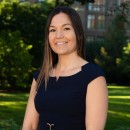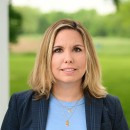Research Office News
Pages
 What Is the Role of Economic Insecurity in Health? The Unequal Burden of Sexual Assault Among Women
What Is the Role of Economic Insecurity in Health? The Unequal Burden of Sexual Assault Among WomenThe recent APA Journals Article Spotlight included Assistant Professor Lisa Fedina’s article exploring how economic factors related to housing, food and health care affect survivors of sexual assault.
- May 22, 2020
- Learn more »
 Katrina Ellis Evaluating Virtual Senior Center in Detroit
Katrina Ellis Evaluating Virtual Senior Center in DetroitAssistant Professor Katrina Ellis is part of a team of U-M researchers evaluating the programs at the Silver Center, which offers enrichment and educational classes via phone to help adults 60 years old or older stay connected. While the program predates the pandemic, it has become especially timely for older adults who may have little or no access to technology and are isolated at home. The U-M team will evaluate how these activities may have helped participants cope with the isolation and stress of the COVID-19 pandemic. “We will learn what went well, what can be improved and how we could expand the program,” Ellis said. “This can bring attention to new ways of delivering services to older adults. We also hope that it increases awareness of community resources and opportunities for learning new things.”
- May 18, 2020
- Learn more »
 Luke Shaefer Named 2020 Andrew Carnegie Fellow
Luke Shaefer Named 2020 Andrew Carnegie FellowProfessor Luke Shaefer has been named a 2020 Andrew Carnegie Fellow. The two-year award provides $200,000 in support of his project, “Deepening Our Understanding of America's Most Vulnerable Communities.” Shaefer is also the Hermann and Amalie Kohn Professor of Social Justice and Social Policy at the Gerald R. Ford School of Public Policy, and the director of U-M’s Poverty Solutions.
The Andrew Carnegie Fellows Program was established in 2015 and provides philanthropic support for high-caliber scholarly research in the humanities and social sciences that addresses important and enduring issues confronting our society. Shaefer is one of 27 fellows named to the 2020 class. The criteria prioritize the originality and potential impact of a proposal, as well as a scholar’s capacity to communicate the findings with a broad audience.
“I am deeply honored to be named one of the Carnegie Fellows,” says Shaefer. “The fellowship will help me and my collaborators immensely in our work to more deeply understand disadvantage in this country and help direct resources and action to where they’re needed most.”
- May 12, 2020
- Learn more »
 David Córdova Selected for Emerging Adulthood Editorial Board
David Córdova Selected for Emerging Adulthood Editorial BoardAssociate Professor David Córdova was selected to serve on the editorial board of Emerging Adulthood, an interdisciplinary and international journal focusing on advancements in theory, methodology and empirical research in transition-age youth.
- May 8, 2020
- Learn more »
 The Stress of Parenting During a Pandemic
The Stress of Parenting During a PandemicAssociate Professor Shawna Lee, author of a recent study on the stress of parenting amid this crisis talks with Tonya Mosley from Here & Now a National Public Radio live midday news program.
- May 4, 2020
- Learn more »

 COVID-19 Pandemic Disrupts HIV Continuum of Care and Prevention
COVID-19 Pandemic Disrupts HIV Continuum of Care and PreventionProfessor Rogério M Pinto and Assistant Professor Sunggeun (Ethan) Park assess how the COVID-19 pandemic is disrupting HIV care and prevention including testing, pre-exposure prophylaxis (PrEP) and primary care visits. Their new research lays out a plan of action to move through the pandemic, as well as the end of the HIV epidemic, in this decade.
- April 29, 2020
- Learn more »

 Matthew Smith and SIMmersion LLC Awarded a $3.1 Million Grant from the National Institute of Mental Health
Matthew Smith and SIMmersion LLC Awarded a $3.1 Million Grant from the National Institute of Mental HealthAssociate Professor Matthew Smith and SIMmersion LLC were awarded a $3.1 million grant from the National Institute of Mental Health. Smith is the scientific lead developing a virtual simulation, which will help autistic teens and young adults learn effective ways to talk and interact with customers, coworkers and supervisors in work settings. Joint PhD student Kari Sherwood is assisting with this project.
- April 17, 2020

 Shawna Lee Discusses Parenting During COVID-19 with Michigan Minds
Shawna Lee Discusses Parenting During COVID-19 with Michigan MindsAssociate Professor Shawna Lee discussed the stress of parenting during the coronavirus pandemic on the latest episode of the Michigan Minds podcast. On March 24, which was shortly after much of the country began social distancing, Lee and PhD student Kaitlin Ward conducted an online survey that asked a series of questions on parenting behaviors, economic situation and well-being.
- April 17, 2020
 Jaclynn Hawkins Will Assess Men’s Health Event In Relation to the COVID-19 Pandemic
Jaclynn Hawkins Will Assess Men’s Health Event In Relation to the COVID-19 PandemicEach year the Michigan Men’s Health Foundation holds a Men’s Health Event in Metro Detroit, which offers low-income men free health and mental health screenings. Research consistently demonstrates that these groups of men are more likely to experience undiagnosed or sub-optimally managed chronic conditions such as diabetes, heart disease and cancer.
Assistant Professor Jaclynn Hawkins has received a grant to both evaluate the impact of this event on health behaviors, and to assess health behaviors and outcomes in relation to the COVID-19 pandemic. Funded by the Michigan Institute for Clinical Health Research, this study will help health care professionals better meet the needs of this at-risk group, while taking into account the specific health needs during the pandemic.
“Low-income men in metro Detroit are one of the most at-risk and vulnerable groups during the pandemic, this research will ensure their voices are heard and their needs are met during this critical time,” Hawkins said.
- April 15, 2020
- Learn more »

 Joseph Himle and Addie Weaver Research on the Opioid Crisis in Rural America Referenced in The Atlantic
Joseph Himle and Addie Weaver Research on the Opioid Crisis in Rural America Referenced in The AtlanticAssociate Dean for Faculty Affairs and Howard V. Brabson Collegiate Professor Joseph Himle and Assistant Professor Addie Weaver, research “A systematic review of rural-specific barriers to medication treatment for opioid use disorder in the United States” is referenced in The Atlantic's “America’s Other Epidemic - A new approach to fighting the opioid crisis as it quietly rages on.” The drug-overdose epidemic has already killed 800,000 Americans—more than have died from AIDS—but the federal government has yet to provide adequate solutions, let alone a level of funding that could stem the crisis.
- April 10, 2020
- Learn more »